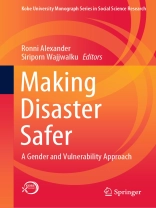This edited book was produced through a transnational and transdisciplinary UNESCO Chair Project on Gender and Vulnerability in Disaster Risk Reduction Support. Contributors come from five disaster-prone Asian countries, and the chapters reflect their rich knowledge and practical experience in disaster management and humanitarian assistance. The chapters, all with a focus on gender and vulnerability, illustrate that gender can make people, especially women, vulnerable. The chapters address the experiences of state and non-state actors responding to disaster and promoting recovery at the local level. However, while women and vulnerable people may be victims of disasters, they also serve as agents for recovery and voices for better disaster preparedness. In sharing both successes and failures, as well as suggestions for the future, this book speaks to the need for transdisciplinary knowledge and multilevel coordination, as well as full equality for all genders and respect for human rights, in order to cope with increasingly more frequent, intense, and complex emergencies. This book is of interest as a text to students in a variety of disciplines who are focusing on disaster and health emergencies, as well as to practitioners and others promoting disaster risk reduction and resilience.
สารบัญ
Gender, Vulnerability and Disaster.- A Critical Introduction to Gender and Disaster: Learning from women survivors in Northeast Japan.- Mainstreaming Gender into Disaster Recovery Policy and Practice: A Case Study of the Post-Earthquake Period in Yogyakarta Special Province, Indonesia.- : Health Literacy about Covid-19 Prevention Among Women in Low-Income Families in Indonesia.- Vulnerability and Resilience of Indigenous Women in Taiwan after a Disaster: Rebuilding a community.- The Vulnerability of Farmers and Post-Disaster Occupational Recovery at the Local Level: Policy Directions and Practical Guidelines in Chiang Rai Province, Thailand.- Local Government Initiatives to Foster Post-Tsunami Resilience in a Rural Coastal Community in West Java, Indonesia.- Emergence of Unconventional Risks and Hazards: Building coping capacities for most at-risk urban communities: Focusing on Malaysia.- Toward Climate-Resilient Development and Management: Developing indicators of climate hazards in Malaysia.- Volunteerism and Disaster Resilience: Institutional Design for Reducing Migrant Workers’ Vulnerability to Floods in Thailand.- Feeling and Drawing the Invisible: Identifying Vulnerability through Alternative Expressions of the 2011 Northeast Japan Disaster.- Looking Forward: Making Disaster Less Devastating.
เกี่ยวกับผู้แต่ง
Ronni Alexander, Ph.D (Introduction, Chapters 1, 10) is a Professor emerita in the Graduate School of International Cooperation Studies, Kobe University. She served as Director of the Gender Equality Office (2017-2022) and Adviser to the President for Diversity (2018-2022), and is the Chair-holder for the Kobe University UNESCO Chair on Gender and Vulnerability in Disaster Risk Reduction Support (2018-present). She holds degrees from Yale University (BA, psychology), International Christian University (MA, public administration), and Sophia University (Ph.D., international relations). Ronni experienced the Great Hanshin-Awaji Earthquake, and has been involved in disaster volunteering and support work. She also taught an undergraduate course on disaster for ten years. Her scholarly work uses narrative and story-telling with a focus on intersections of militarization, gender and security, particularly in relations to Pacific island countries. She also investigates the use of art in disaster support, including continuing activities using art and stories in the areas affected by the 2011 Fukushima disaster and interrogating the COVID-19 pandemic through art in Popoki’s Mask Gallery. In 2020, she was named Distinguished Scholar by the Peace Studies section of the International Studies Association. Her publications include her Popoki’s Peace Book picture book series (publisher: Epic, Kobe) and many scholarly publications. Her most recent publication is Popoki’s mask gallery:Searching for everyday anshin through art during the COVID-19 Pandemic, 2022, Kobe University Press
Siriporn Wajjwalku (Conclusion) is a Professor in the Faculty of Political Science, Thammasat University in Bangkok. She is a former Dean of Faculty of Political Science, Thammasat University (2010-2013), and a former Dean of School of Social Innovation, Mae Fah Luang University, in Chiangrai, Thailand (2014-2021). She is also a founder and former President of Japanese Studies Association of Thailand (2012-2017). She holds degrees from Thammasat University (BA in Political Science) and Nagoya University (MA and Ph. D in International Relations). Her research interest includes Japan’s politics and foreign policy with the focus on development cooperation with Southeast Asian countries. She is an author of Japan and Disaster Relief: Policy, Mechanism, and Actors (Chulalongkorn University Publishing House, 2019); Japan and Development Cooperation: Policy and Practice in Mekong Countries (Chulalongkorn University Publishing House, 2017); Regional Cooperation and Food Security: ASEAN Emergency Rice Reserve (Thammasat University Publishing House, 2015). She is also a co-editor of Advancing the Regional Commons in the New East Asia (Routledge, 2016) She was a visiting professor at Saga University (2006) and Hiroshima University (2015), Japan












